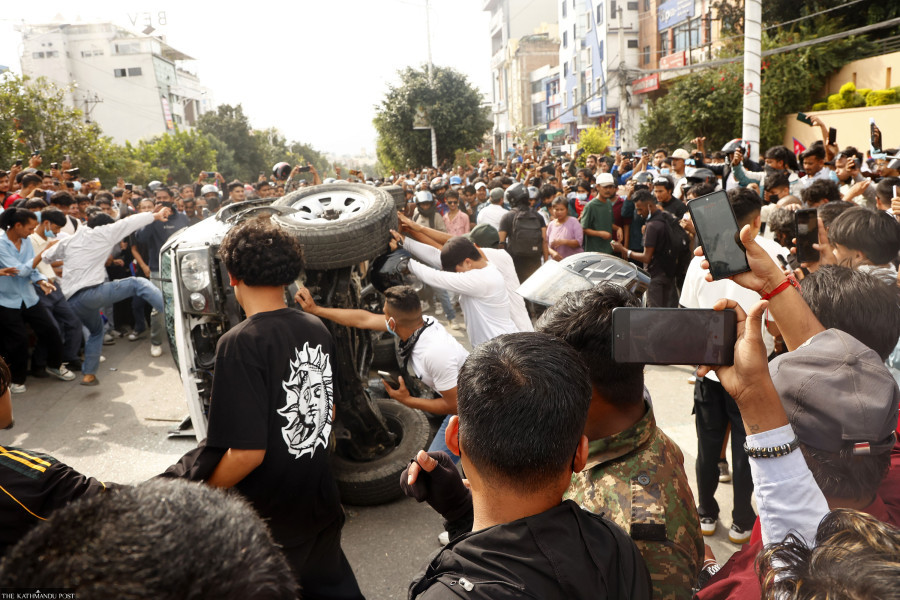Columns
Political clientelism and upcoming polls
If Nepal’s youth can inspire voters to imagine a politics beyond masu bhaat, they can redefine democracy.
Krishna Sharma
After last week’s deadly protests, things have started to settle down in Nepal. We now have an Interim Prime Minister in Sushila Karki, and the cabinet is starting to fill up with popular figures who have had a successful career in fields related to their assigned ministries. It won’t be far off to assume that these are “diplomatic” assignments. And, while no official announcement has been made, mainstream political parties have indicated that they will partake in the upcoming election.
One hopes that the focus, therefore, will quickly shift to the March elections.
Although the popular support at this point seems to favour the youth involved in the protests, especially as the emotions continue to run high, they have many challenges to overcome. Some of those are obvious. They don’t have a political party or organisation to represent and mediate the many voices and demands of the people. This shortcoming gives an advantage to the mainstream political parties that enjoy the existing machinery of cadres, unions and local committees. The Gen Z leaders depend on social media to circulate their messages. While it helps that most young people are online, some, especially older voters, are not. They have to figure out how to reach them.
But there is one more problem, which will perhaps determine whether the youth will be able to institutionalise the change into the country’s political structure. It is the rampant political clientelism, and the informal politics associated with it.
It will be a costly mistake for Gen Z leaders to believe that electoral outcome in Nepali politics is primarily determined based on policy proposals, ideology, competency or integrity of the individual running for office. These have little to no contribution in electoral outcomes in most constituencies. What matters is political clientelism, or, in colloquial terms, the prospects of “masu bhaat.”
Voters ‘will’ expect favours
Political clientelism is a concept in political science that speaks about how politicians use personal favours, which may include goods, money, job offers and business contracts, in exchange for electoral support. It’s basically quid pro quo in practice but can come in many different forms. Take, for instance, the free gasoline or money that gets offered to people for taking part in rallies of major political parties in every federal or local election. Or the governmental contracts that go to businesses or companies that supported the ruling party during the elections.
But it’s more than that. Many Nepalis don’t know that the primary duty of lawmakers is to make laws and shape national policies. People view their members of parliaments (MPs) as the gateway to state resources. As a result, elections become less about who will write laws that will benefit an entire population and more about who can bring bikas: contracts and favours back home. For example, people in a constituency in Nawalpur (or Nawalparasi East) still speak about the roads that Shashanka Koirala has “built” in different areas of Nawalpur or about hospitals he might bring, but never about what policies he has advocated for in the parliament. Substitute him for any other MP from any other party and the result won’t be any different.
In rural areas, this can be worse. For people in villages that don’t have healthcare units for their sick and elderly, schools for their children or roads that connect them to the rest of the country, a chance to see that happen weighs far above national level policies that could bring prosperity to the overall population in the future. Therefore, it makes sense that research has found political clientelism to be most pervasive in areas where economic control is in the hands of a “narrow elite.”
All of this is not just by accident though, or because Nepal is underdeveloped. It has deep roots in the way politics has evolved since the Panchayat years and the restoration of multiparty democracy. From the very beginning, politicians have relied on distributing favours to consolidate their base. Over time, this has become institutionalised through mechanisms like the constituency development fund to channel money into their constituencies. Every time there was a talk about this fund being taken away, MPs cried foul. In a way, this reinforces people’s imaginations of MPs as patrons or benefactors.
Fighting back
The first step is to acknowledge that this kind of political clientelism is not a fault of our democratic system that otherwise runs well. It is rather the central feature of it. Only after acknowledging this fact can we move towards tackling it.
It might be easier to tackle this in cities, as opposed to rural areas, as we’ve seen in the last local and federal elections. Balendra Shah got elected as the mayor of Kathmandu Metropolitan City and Harka Sampang got elected in Dharan. Similarly, many MPs of the Rastriya Swatantra Party got elected presumably without engaging in much patronage politics. However, it is hard to imagine such electoral victories outside the major population centres and that is where the core challenge lies.
For one, the youth has to be more organised. Secondly, youth leaders, civil societies and the media must invest in educating the average voter so that citizens can begin to see their representatives as lawmakers and policy makers rather than patrons. The youth has to find a way to create transparent funding mechanisms and not depend on the same networks of favours they are trying to replace.
This will not be easy, and things might not change quickly enough to drastically alter the outcomes of the upcoming election. But if Nepal’s youth can organise, resist the temptations of clientelism and patronage politics, and inspire voters to imagine a politics beyond masu bhaat, they may not just win elections but also redefine democracy in Nepal.




 11.12°C Kathmandu
11.12°C Kathmandu















